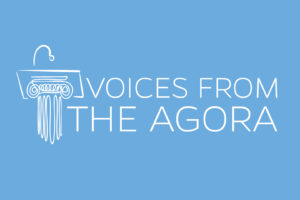
If you picked up a book on bureaucracy, what would you expect to see in it?
For Casey Eilbert, a Postdoctoral Fellow at the SNF Agora Institute, that question is a way of listening. The answers she hears remind her that bureaucracy is how people experience fairness, trust, and accountability in society, even if they do not always think of it in those terms. Some mention endless government forms and byzantine queues. Others think of nonprofit rules or corporate hierarchies. Each answer is different, but together they show how deeply bureaucracy shapes ordinary life.
Eilbert is a historian who studies how bureaucracy developed as both an idea and an institution in the United States. She came to SNF Agora steeped in archival work, tracing patterns through rulebooks, personnel files, and departmental memos. The documents revealed a system in detail, but the connection to contemporary life was harder to see. Her fellowship at SNF Agora helped bring that connection into focus.
“My fellowship here has given me opportunities to talk with broad audiences and made me more confident in my ability to do so,” she says. “I am a historian, so it is easy to get lost in the past. But SNF Agora has encouraged me to think about the contemporary implications of the history that I am writing.”
“Working in an interdisciplinary setting like SNF Agora keeps me mindful of the largest stakes of my work,” she says. “It helps me avoid getting bogged down in narrow debates and instead ask why bureaucracy matters at the highest level.”
Listening to others turned her research from a solitary study into a shared dialogue. Fellows, faculty, and visitors often bring their own stories, comparing what bureaucracy looks like in their fields. These exchanges have pushed her to see her role differently, not only uncovering patterns in history but connecting them to the present. One conversation with SNF Agora faculty member Steven Teles pointed her toward a network of scholars studying “state capacity,” the effectiveness of public organizations. That link stretched her work beyond rules and archives into broader debates about trust, performance, and the capacity of institutions to meet public needs.
“Historians can be shy about engaging in contemporary debates,” she admits. “But questions about bureaucracy are super relevant right now, and my research can productively inform ongoing political discussions. SNF Agora has encouraged me to engage them instead of shying away.”
Eilbert sees bureaucracy as a living practice, revealing how our society organizes democracy. Her fellowship at SNF Agora has given her the confidence to share that perspective in public. She listens closely to how others experience rules and connects those experiences back to the long arc of history.
“The rules we live by are never abstract,” she says. “They shape people’s lives every day.”

